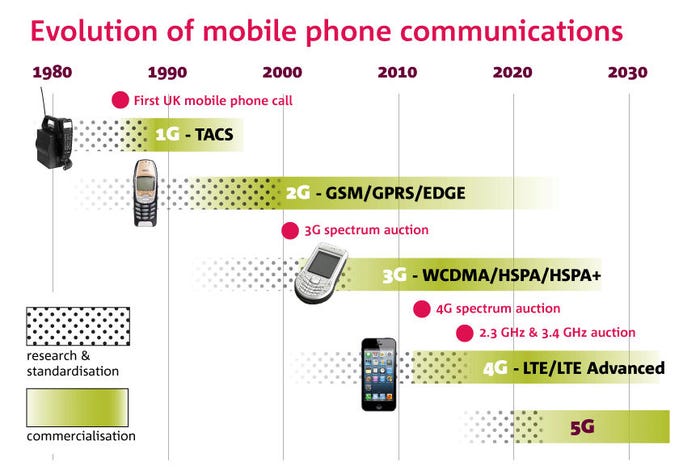Ofcom launches consultation on bands above 6GHz for 5GOfcom launches consultation on bands above 6GHz for 5G
Ofcom has launched a consultation seeking industry input on spectrum bands above 6GHz that might be suitable for 5G. The UK regulator said that while it is not yet known what exactly 5G will be, it wants to build an understanding of future spectrum needs.
January 19, 2015

Ofcom has launched a consultation seeking industry input on spectrum bands above 6GHz that might be suitable for 5G. The UK regulator said that while it is not yet known what exactly 5G will be, it wants to build an understanding of future spectrum needs.
The competition authority said it is expected 5G will offer much faster speeds, possibly 10 to 50 Gbit/s compared to current average 4G download speeds of 15Mbit/s.
“We want to explore how high frequency spectrum could potentially offer significant capacity for extremely fast 5G mobile data,” Philip Marnick, Ofcom Spectrum Group Director, said. “This could pave the way for innovative new mobile services for UK consumers and businesses.”
The very high frequencies of 6GHz and above are currently used by various organisations, including scientific research, satellite broadcasting and weather monitoring. Ofcom said these bands, which have the potential to support very high demand areas and users, could be made available to the wireless industry. Ofcom reckons the bands could also support a variety of uses such as financial trading, entertainment and gaming, as well as holographic projections.
“We want the UK to be a leader in the next generation of wireless communications,” Steve Unger, Ofcom Acting Chief Executive, said. “Working with industry, we want to lay the foundations for the UK’s next generation of wireless communications.
“5G must deliver a further step change in the capacity of wireless networks, over and above that currently being delivered by 4G. No network has infinite capacity, but we need to move closer to the ideal of there always being sufficient capacity to meet consumers’ needs.”
One of the reasons Ofcom is looking at these high frequencies is the simple fact that there isn’t much availability lower down the spectrum. However, if as a result of the consultation Ofcom decides to allocate these bands for the mobile industry, they will most likely be traded at an auction in the same way as happened before 4G and 3G.
Spectrum auctions historically can generate a nice chunk of money for the government, and the fees are one reason why operators can sometimes express frustration at the keenness for the next generation technology. Understandably they would like to see some return on their investment before having to fork out another load of cash at the next auction.
Ofcom is not the first to consider the significance of higher frequency spectrum for 5G. Ericsson for example recently announced the addition of license assisted access (LAA) to its small cell portfolio. This LTE technology allows users to tap into unlicensed spectrum, typically used by wifi, to augment their cellular performance. According to Ericsson, there is approximately 55oMHz of un-utilised spectrum in the 5GHz UNII band, which it plans to use with its LAA technology.
It is also worth noting that we currently have no idea how significant these higher frequencies will be and how effectively the potential higher bandwidth will be exploited in terms of cell range, backhaul, etc. The consultation closes on February 27. Here’s an Ofcom diagram showing the historical evolution of mobile phone tech in the UK.

About the Author
You May Also Like










.png?width=300&auto=webp&quality=80&disable=upscale)


_1.jpg?width=300&auto=webp&quality=80&disable=upscale)